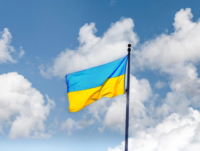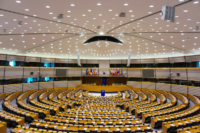
Ukraine peace won't stop Russian aggression
Foreign policy is rarely black or white. Rather, our world and the foreign policy that seeks to shape it consists of shades and nuances. It is the responsibility of diplomacy to bring out these nuances, to analyse them, and to make decisions based on them. As the world is so complex, black and white divisions of good and evil or best and worst are rare. However, some such classifications still exist. The brutal Russian war of aggression against Ukraine, which President Putin has been waging since 24 February 2022, is an example.
The reason for the war of aggression, which is unjustified and contrary to international law, cannot be found in relativisations or even in the fact-free assertion of Ukrainian complicity. Nor can it be found in the expansion of NATO, which sovereign states have joined of their own volition. The reason for the invasion is rather the neo-imperialist aggression that has been driving President Putin for 18 months now. This simple truth must be highlighted as even a year and a half following the start of the war there are still deniers who close their eyes to this reality. Particularly these days.
On 24 August, Ukraine celebrates its Independence Day. This year, the commemoration of Ukrainian independence had a special significance since it coincided with the sad milestone of one and a half years of war in Europe.
32 years ago, on 25 August 1991 and thus one day after the declaration of independence, Russia recognised Ukraine’s independence. Under the 1997 Treaty of Friendship, it reaffirmed Ukraine’s sovereignty and territorial integrity. On 24 February 2022, President Putin, in complete disregard of these historical facts, unleashed his war of aggression.

Intended as a blitzkrieg, the Russian invasion has turned into a bitter war of attrition. While Russia tramples on its special responsibility for peace and security as a permanent member of the UN Security Council, the free world stands in solidarity with Ukraine and Russia is thus largely isolated.
President Putin’s colossal belligerent miscalculation has not only put Russia on the international sidelines. It has contributed to the strengthening of the European Union in terms of foreign and security policy, to the enlargement of NATO and to the EU candidate status for Ukraine. Despite all the prophecies of doom, the EU has never been more united and determined to support and welcome Ukraine, this epitome of a European nation, into its midst. It will be our most essential task as the European Union to maintain this unity as Ukraine continues on its European path. Austria will support Ukraine on this path.
Some people still ask why Austria has to take a clear position on the Russian war of aggression. The answer is quite simple: because it is also about Austria’s security and about the system of a rules-based, international order in which the principle of pacta sunt servanda applies. This foundation is vital for the survival of a state like Austria, with nine million inhabitants in the centre of this continent.
This has nothing to do with Austria’s neutrality, as Austria has never in its history been neutral as far as values are concerned. What did the fledgling Republic of Austria do when Soviet tanks rolled through Budapest in 1956, barely a year after the restoration of Austrian sovereignty and the adoption of the Federal Constitutional Law on Perpetual Neutrality? Austria not only supported every resolution in the UN General Assembly against the Soviet Union, but even submitted its own.
Many are calling for immediate peace today. A call we would all like to join in. However, if ceasefire meant de facto recognition of violent conquests, if injustice were “frozen”, then that would not be peace. Rather, such a state of affairs would further stimulate the Kremlin’s lust for conquest and be the seed of future aggression.
From the Ukrainian perspective, this would mean capitulation, which would make survival in independence and freedom impossible. Those who call for immediate peace may mean well, but in reality, they are supporting Russia. Peace and appeasement are not synonymous.

Instead, what is needed is a comprehensive, just and lasting peace, as laid out in President Zelensky’s 10-point peace plan. Austria supports this approach. In the end, a stable, lasting peace will only be achieved at the negotiating table.
Our common goal therefore remains unchanged: the restoration of Ukraine’s sovereignty and territorial integrity within its internationally recognised borders. The independence of Ukraine. Until then, Austria will continue to stand unwaveringly with Ukraine for as long as it takes.
Written by both Foreign Minister for Austria Alexander Schallenberg and Foreign Minister for Ukraine Dmytro Kuleba.

Alexander Schallenberg is the Federal Minister for European and International Affairs of the Republic of Austria.













